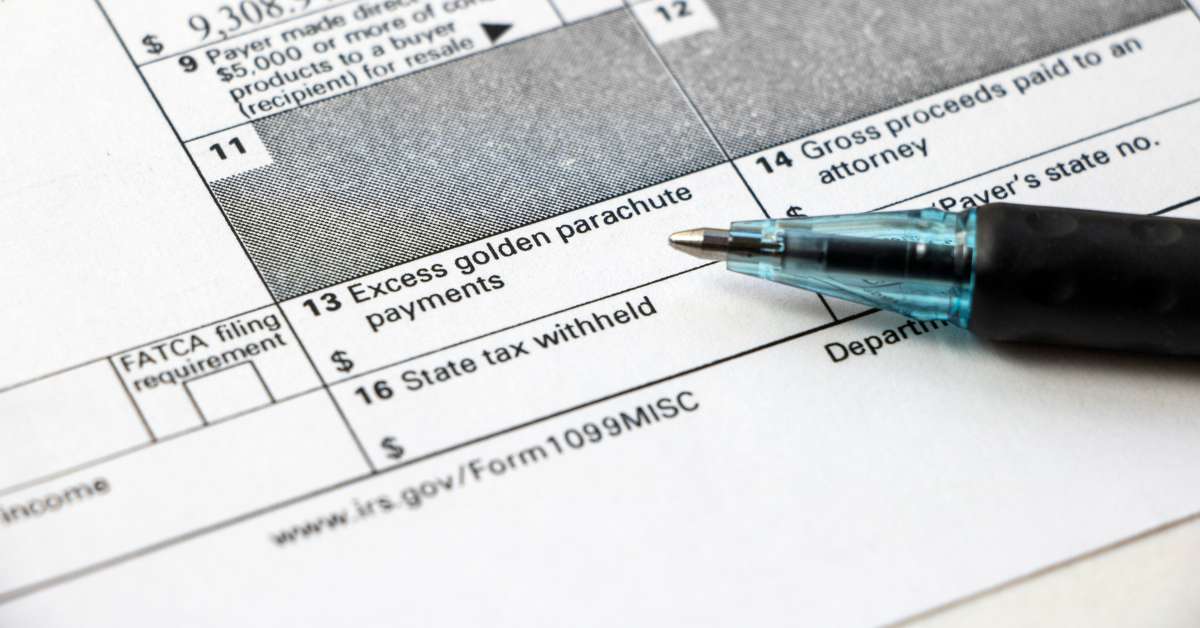Language:
Can I 1099 Myself From My LLC?

You can 1099 yourself from an LLC. This offers significant advantages, along with a few disadvantages (see self-employment taxes below). However, if you’re an entrepreneur with a side hustle or a full-time business operating through an LLC, issuing a 1099 can make sense.
As a small business owner, learning about options of how to take income from an LLC is important. Read on to answer the specifics of “Can I 1099 myself from my LLC?” for your situation.
What Does It Mean to 1099 Yourself From Your LLC?
It’s possible to 1099 yourself from your LLC. To 1099 yourself from your LLC means to treat yourself as an independent contractor. In this case, you receive payment for independent work on the business. Companies must give a 1099 to all independent contractors who earn more than $600 annually, and it’s no different when you 1099 yourself.
Assuming the LLC has stable, consistent earnings, how much can you pay yourself? According to the IRS, you may pay yourself “reasonable compensation” for the work. Many freelancers choose to set up an LLC for the liability protection it offers. Then, you have the option to 1099 yourself, take profit distributions, or pay yourself as an employee.
What Are the Specific Criteria to 1099 Yourself From Your LLC?
To 1099 yourself, you’ll need to meet a few criteria. First, you must be classified as a single-member LLC or sole proprietor. However, in some cases, multi-member LLCs can also use a 1099 to pay members. Speak with your CPA about this option for your situation.
Second, you must have a profit from your LLC subject to self-employment tax. Finally, you must report your business income and expenses on Schedule C of your personal income tax return (Form 1040).
When you file a 1099 for yourself, you’ll report all income on your individual income tax return. You’ll need to pay self-employment tax and applicable federal and state taxes.
Interestingly, LLC members can also opt to take a loan from the business. With this option, you don’t need to file a 1099. With this option, the loan must be repaid with interest according to the LLC’s operating agreement.
How to 1099 Yourself From Your LLC?
To make yourself an independent contractor from your LLC, you’ll need to file IRS Form W-9 with the LLC, just as you would with any other company. The LLC must file IRS Form 1099-MISC at the end of the year.
When you pay yourself as an independent contractor from the LLC, you don’t have to take payroll taxes out of your paycheck. Your personal account receives the full payment amount. This is not real savings, as instead of deducting payroll taxes, you’ll pay the same in self-employment tax when you pay taxes as an independent contractor.
Advantages of Paying Yourself as a 1099 Independent Contractor From Your LLC
Here are some of the major advantages to paying yourself as a 1099 independent contractor from your LLC.
1. Tax Flexibility
As a 1099 independent contractor, you have more flexibility in managing your taxes compared to being an employee. You can take advantage of deductions and write-offs related to your business expenses, potentially reducing your tax liability. While using LLC, pass-through taxation can offer similar benefits, but you may have additional flexibility as a 1099 independent contractor.
2. Control Over Finances
Paying yourself as a 1099 allows you greater control over your finances. You can determine your own salary, set aside money for savings or investments, and decide when and how much to pay yourself. As you grow a business with an LLC, this gives you greater financial opportunities.
3. Retirement Planning
Being a 1099 contractor allows you to contribute to a Simplified Employee Pension (SEP) IRA or a solo 401(k) plan, potentially enabling higher retirement contributions than an employee. If saving for retirement is your priority, becoming a 1099 contractor through your LLC can offer additional options.
Disadvantages of Paying Yourself as a 1099 Independent Contractor From Your LLC
There are some disadvantages to paying yourself as a 1099 independent contractor, such as an additional tax burden compared to employees. Here’s what you may want to consider.
1. Self-Employment Taxes
As a 1099 contractor, you are responsible for paying both the employee and employer portions of Social Security and Medicare taxes, commonly known as self-employment taxes. This can increase your tax burden compared to being an employee.
The self-employment tax rate is 15.3% of net earnings. That includes a 12.4% Social Security tax and a 2.9% Medicare tax on net earnings. Regardless of your tax bracket, deducting an additional 15.3% from your net earnings is a major disadvantage for many people. Learn more about tax filing requirements for a US company here.
2. Lack of Benefits
Unlike employees, 1099 contractors do not receive benefits such as health insurance, paid time off, or retirement plans from their LLC. You are responsible for obtaining your own benefits, which may lead to additional expenses.
If you give up a position as an employee with benefits, the burden of health insurance, retirement planning, and time off will fall on you. This downside is eliminated if you work for your LLC as a 1099 independent contractor while maintaining another position with benefits.
3. Inconsistent Income
As a 1099 contractor, your income may be less stable and predictable than an employee’s. This can make budgeting, saving for retirement, or even applying for a mortgage challenging. However, this downside could become insignificant as you build greater income for the LLC. Learn more about 1099 vs. LLC here.
Other Alternatives for Paying Yourself as an LLC
Not sure whether paying yourself as a 1099 independent contractor makes sense? You have alternatives as an LLC owner. Here are the other options.
1. Paying Yourself as an Employee (W-2)
Many LLC owners opt to pay themselves as a W-2 employee. With this option, you and any other owner could receive paychecks as an employee.
If the LLC brings in consistent revenue to cover your salary, this can eliminate many of the downsides of paying yourself as an independent contractor. This makes it easier to budget and prove salary income to get a mortgage or personal loan.
If you pay yourself as a W-2 employee, you can elect to have the LLC treated as an S-corporation for tax purposes. You will only pay FICA, Medicare, and Social Security taxes on the salary or wages you pay yourself, not on all business profits. That means you’ll save the 15.3% in self-employment tax on your take-home income.
Pros of paying yourself as an employee include a stable salary, proof of income, and lower tax payments off your take-home pay. The cons are that this requires some additional paperwork and administration.
2. Profit Distributions
You can also opt to pay yourself through profit distributions or an owner’s draw. This means that business profits pass through to the LLC owners.
For a single-member LLC, the process is simple. You’ll distribute money to your personal bank account when money comes into the LLC. In the case of multi-member LLCs, the operating agreement delineates how profits are allocated and at what frequency.
The pros of profit distribution are the simplicity of administration. The possible disadvantage is that you’ll have to pay self-employment taxes on all business earnings instead of only a designated salary.
3. Keeping the Money in the Business
Finally, you always have the option to reinvest all earnings into the business or build business savings. You will still have to pay income taxes on any business profit. Since LLCs are treated as pass-through entities, you will generally report all business income on your income tax return.
Should You 1099 Yourself?
There are obvious pros and cons to 1099 yourself. Treating yourself as a W-2 employee or taking profit distributions can make more sense for many LLC owners. However, if you want to start earning income as an independent contractor, paying yourself as a 1099 independent contractor can make sense.
Ready to start your LLC and take your business to the next level? doola formation services can help. We offer fast, low-cost formation services. You’ll get help with the paperwork, opening a business bank account, and an EIN. Get doola formation services here!
FAQs
Will 1099-ing myself affect my liability protection as an LLC owner?
1099-ing yourself won’t affect your liability protection as an LLC owner. You can hire employees or independent contractors to work for the business as an LLC owner. As an independent contractor, you’re not considered an employee or representative of the business.
Is there a specific form I need to fill out to 1099 myself from my LLC?
It’s important to maintain and file all forms correctly to maintain the independent contractor relationship with the LLC. You need to fill out Form W-9 for the LLC, and as the name implies, you’ll receive Form 1099 from the LLC to file with your individual income tax return.
How often can I 1099 myself from my LLC?
You can 1099 yourself from the LLC as often as you work for the LLC. Assuming the LLC has sufficient income, you could 1099 yourself weekly or monthly. The IRS specifies that you can only pay yourself for an amount that would be reasonable for the work performed.
Can I 1099 myself for different services I provide as an LLC owner?
You can 1099 for different services you provide as an LLC owner, as long as you can document those services. For example, you could perform work as an independent contractor, bookkeeper, writer, or company manager.
Can I 1099 myself if I have employees working for my LLC?
Like any other business, an LLC has the option to hire employees as well as independent contractors. That means you can 1099 yourself even if your LLC has employees. It’s important to file all paperwork correctly for both employees and independent contractors to maintain the LLC in good standing.
Can I 1099 myself if my LLC is a partnership with multiple owners?
If you’re in an LLC partnership with multiple owners, generally, you will take distributions rather than a 1099. In this case, you will still take earnings and be responsible for taxes, including self-employment taxes. You can speak with a CPA to understand the specific options for your LLC situation. Learn more about LLC partnerships and the possibility of 1099.
Keep reading
Start your dream business and keep it 100% compliant
Turn your dream idea into your dream business.














